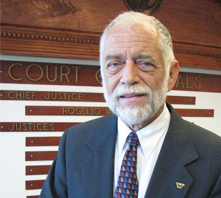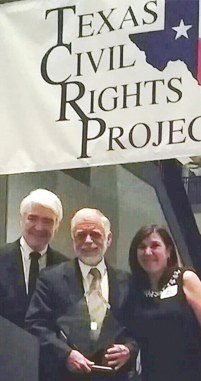© 2015 The Texas Lawbook.
By Patricia Baldwin
(Jan. 26) – In the early 1970s, Jim Harrington took his 85-year-old grandmother to stand in a United Farm Workers picket line in their home state of Michigan. Her sign read: “Don’t buy grapes.”

“She lived frugally and gave her money to the poor,” he said. “She would always visit people in the hospital and those having personal crises. She went to funerals to make sure there was someone there to say goodbye.”
In November, the Texas Access to Justice Foundation recognized the longtime civil rights lawyer with the prestigious Harold F. Kleinman Award. Named for the Foundation’s first chairman, the award is given to individuals whose “outstanding character, commitment and public service to the people of Texas make them true leaders in access to civil justice.”
Besides the obvious, Harrington said he was honored that Texas Supreme Court Chief Justice Nathan Hecht presented the award during the Foundation’s 25th Anniversary Bill of Rights Dinner in Austin.
After all, Harrington, 69, has sued the Supreme Court of Texas three times – and survived to talk about it, he added. (More on that later.) “I’m thinking of putting that on my tombstone,” he said.
Dick Tate of Richmond-based Tate Moerer & King has volunteered with the Texas Access to Justice Foundation for 23 years and now chairs its board of directors. Over the decades, he said, he has observed three categories of people: 1) those who are truly committed without regard to their resources, 2) those who are heroes and 3) Jim Harrington.
 “He has perhaps done more than anyone to bring about the current infrastructure for access to justice in Texas, starting with a lifetime commitment,” Tate said. The result, he added, is not a cause, but a “movement” that has made Texas the envy of other states.
“He has perhaps done more than anyone to bring about the current infrastructure for access to justice in Texas, starting with a lifetime commitment,” Tate said. The result, he added, is not a cause, but a “movement” that has made Texas the envy of other states.
Part of building that movement was a nine-year legal battle that ended in March 2003, when the U.S. Supreme Court ruled in favor of the state’s use of the Interest on Lawyers Trust Accounts (IOLTA) program to help pay for legal services to the poor.
Among his major litigation successes, Harrington considers a series of lawsuits that eliminated the exclusion of farm and ranch laborers from the Texas Workers’ Compensation Act.
He also gained the unanimous vote of the Texas Supreme Court in establishing privacy as a fundamental right of state employees under the Texas Constitution.
Harrington described the mission of the Texas Civil Rights Project as providing civil rights litigation, education and advocacy. Since its inception, the organization has handled more than 3,000 legal cases for poor and low-income clients.
“We take on every kind of issue you can imagine,” he said. Unfortunately, he added, the organization can undertake “very few” of the cases brought to them.
“We have to pick and choose — and triage,” he said. “We take the cases that will have systemic change, change that sticks.”
After receiving his law degree in 1973 from the University of Detroit, where he also had earned a master’s degree in philosophy, Harrington worked for a decade as director of the South Texas Project in the Rio Grande Valley.
In 1983, he became legal director of the Texas Civil Liberties Union in Austin.
He started the Texas Civil Rights Project with an unpaid staff of two. The Project currently has a staff of 40 with offices in Austin, El Paso, San Juan, Houston and Odessa.
Harrington also serves as an adjunct professor at the University of Texas School of Law. He has served on human rights delegations to Honduras, Nicaragua, Guatemala, Chile, Israel and Palestinian territories.
As for what’s next, Harrington plans to return to his roots of community organizing. A new director for the Texas Civil Rights Project is expected to be selected in the first quarter of 2016.
Harrington said he’s been thinking about the transition “for quite a while.”
He’s proud of the TCRP’s increased recruitment of large law firms for pro bono work as well as the group’s summer program for law students.
He said he continues to have faith in the goodness of people. And, he noted, civil rights change does happen, albeit “extremely slowly.”
Do you have a special avocation, hobby or other lifestyle interest to share? Please email patricia.baldwin@texaslawbook.net.
© 2015 The Texas Lawbook. Content of The Texas Lawbook is controlled and protected by specific licensing agreements with our subscribers and under federal copyright laws. Any distribution of this content without the consent of The Texas Lawbook is prohibited.
If you see any inaccuracy in any article in The Texas Lawbook, please contact us. Our goal is content that is 100% true and accurate. Thank you.
